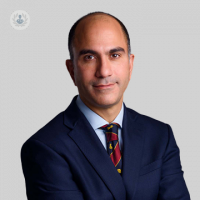Ask an expert: What’s causing my voice problem?
Autore:Problems affecting the voice can have a huge impact on all areas of lives, including socialising, work and relationships. Although most people experience a sore throat from time to time, more persistent voice problems require specialist investigation and treatment. In this informative article, leading consultant ENT and head and neck surgeon Mr Vikram Dhar sheds light on the most common causes of voice problems and the importance of seeking medical help.

What are the most common voice problems people suffer from?
There are two main categories of patients with voice problems. Functional dysphonia refers to voice problems caused by the way the patient is using the larynx, often called the voice box.
In other cases, structural problems within the voice box are behind the problem. Some patients experience this type of problem due to a growth on the voice box itself, which may be either cancerous or non-cancerous. In other cases, the nerve that goes to the voice box isn't working so some investigation is required to determine the source of the problem.
Patients with functional dysphonia and structural problems with the voice box similarly present with hoarse voices so specialist care is required to find the right treatment solution.
Can voice problems be related to cancer?
As I've already touched on, the main causes of voice problems can be split into two categories. In either case, the primary concern we have as doctors is to rule out anything sinister. This includes establishing if there is any sign of cancer as we know that patients with cancers often have a persistently hoarse, harsh voice. Ninety-five per cent of cases of cancers of the voice box occur in smokers.
The best way to rule out a cancer of the voice box is to examine it, using a telescope or the nasendoscope which is passed through the nose whilst you're awake. This allows us to take a good look at the voice box and see if there is anything to be concerned about.
However, not all voice problems are caused by cancer. Some benign (non-cancerous) growths such as cysts and polyps can develop on the vocal folds which prevent the voice box from functioning normally. In other cases an immobile vocal cord or conditions which prevent the vocal folds from moving properly can also be behind voice problems.
When is a voice problem serious?
I think that only a patient can answer that question because they are the one suffering the consequences of the problem. The voice is so integral to our personality and the way we project ourselves and therefore it’s not for me as a clinician to say what is or isn’t severe.
In my voice clinic, I often see patients who are professional voice users whose livelihood is based around singing or speaking. Also, these days we are working online more and more and we need to be able to communicate through Zoom or Microsoft Teams. We therefore can't rely on nonverbal communication as much so I would say that the severity of this type of issue is patient specific and very subjective.
What happens if voice problems are left untreated?
The most important thing is that we don't miss a cancer or even precancerous cells like dysplasia, which if left untreated can progress to be quite serious. Of course, the earlier we spot cancers and dysplasia, the earlier we can manage them and the better the outcome is likely to be.
In terms of patients with functional problems, if the voice box is being used in an abnormal way, you can get into bad habits quite quickly. Therefore, undergoing treatment which uses techniques in close collaboration with a voice therapist can help patients get out of those bad habits in order resolve their problem.
How important is it to rest the voice?
People often ask me this question. The voice is so crucial to communication that it is almost an impossible task to completely rest it. I personally encourage caring for the voice and not abusing it, rather than resting it entirely. That means avoiding shouting, whispering and throat clearing as those sorts of behaviours are traumatic to the vocal folds and can do a lot of damage.
What are the most effective home remedies to help treat voice problems?
That's an interesting question. The key tool in this case is hydration. The vocal folds sit on the vocal ligament a little bit like a shirtsleeve sitting over an arm and for it to have a nice, beautiful wave and create a good voice you have to have good lubrication and hydration. When this isn’t the case, you may experience the feeling of a dry throat or a frog in the throat.
Therefore, it's absolutely critical when you've got a voice problem to drink plenty of water. If you don’t have another medical condition that may be affected, you should try to consume up to about two litres of water a day. Often patients may be dry for other reasons such rhinitis which leaves them unable to breathe through the nose or diabetes which can cause patients to lose too much water and these conditions should be attended to by a specialist.
Often people say that their throat can be soothed by having something like a honey and lemon. I won’t deny that they can be useful but the key thing is hydration and drinking plenty of water.
If you are concerned about voice problems and would like to book a consultation with Mr Dhar, don’t hesitate to visit his Top Doctors profile.


